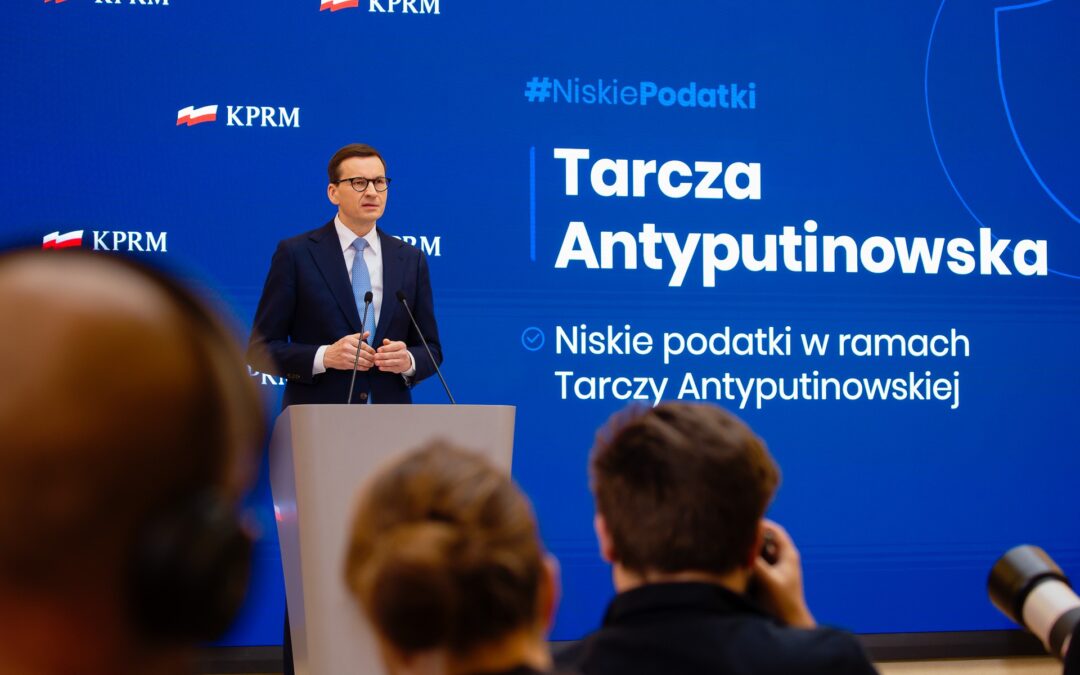Poland’s government has announced plans to introduce a new set of tax reforms, which will see income tax reduced, a middle-class tax allowance withdrawn, changes in how business owners calculate healthcare contributions, and a preferential system for single parents restored.
It has presented the policies as part of its measures to protect Poles from the economic consequences of Russia’s war in Ukraine. However, commentators note that the changes undo parts of the government’s flagship tax programme, the “Polish Deal”, which was introduced at the start of this year but has been beset by problems.
“Difficult times are coming,” said the prime minister, Mateusz Morawiecki, unveiling the new tax system yesterday. “That is why we are preparing new elements of the anti-Putin shield, which will protect Poles against the effects of war in Ukraine, such as high prices.”
“We do not want to be slaves of Putin and Russia’s,” he continued. “Thus our aim is a strong and stable economy.”
Morawiecki was referring to an extension of a new programme, unveiled earlier this month, that is intended to “de-Russify” the Polish economy and protect Poles from high inflation. The government has labelled the initiative an “anti-Putin shield”.
The first part of the programme involved policies to bring down high food prices by supporting farmers, additional payments to pensioners, and further investment in energy independence.
The latest round of policies, announced yesterday, will reduce income tax from 17% to 12% for those earning up to 120,000 zloty (€25,300) annually. This would apply to everyone in that tax bracket, “without any ‘catches'”, said Morawiecki. He says 25 million taxpayers will benefit from the change.
The government also wants to cancel the so-called “middle-class allowance”, which it introduced last year as part of the Polish Deal. But the future regulation is to include a guarantee that taxpayers will not face any losses due to this change.
The new measures will also mean different calculations for how business owners calculate healthcare contributions, reports Business Insider Polska. They also withdraw previous changes to how single parents settle their taxes, restoring a more preferential system but removing a tax relief of 1,500 zloty.
❗️ Uprościliśmy tabelę 😉 Tak wygląda różnica.
Obniżka PIT z 17% do 12% oznacza, że osoby na skali zapłacą niższe podatki. Wyliczenia 👇 i komentarz @SamborskaM: https://t.co/RXORSgem7f
Zmiany miałyby wejść w życie od 2023 r., (wstecznie od 1 lipca 2022 r.) #PolskiŁad pic.twitter.com/H1dvvacbBq
— Grant Thornton Polska (@GrantThorntonPL) March 24, 2022
The proposed changes are now to be consulted and submitted to parliament by the end of April. The estimated cost to the state budget would amount to 15 billion złoty (€3 billion).
The finance ministry expects that the proposed changes would become law in 2023; however, they are to take effect retroactively from 1 July 2022.
“We want to consult this well; we’re waiting for critical comments if there are any faults in the proposed elements,” deputy finance minister Artur Soboń said yesterday. After the recent introduction of tax changes under the Polish Deal, the government faced criticism for not having planned and prepared them properly.
Main image credit: Kancelaria Prezesa Rady Ministrów/Gov.pl (under CC BY 3.0 PL)

Agnieszka Wądołowska is deputy editor-in-chief of Notes from Poland. She is a member of the European Press Prize’s preparatory committee. She was 2022 Fellow at the Entrepreneurial Journalism Creators Program at City University of New York. In 2024, she graduated from the Advanced Leadership Programme for Top Talents at the Center for Leadership. She has previously contributed to Gazeta Wyborcza, Wysokie Obcasy and Duży Format.




















